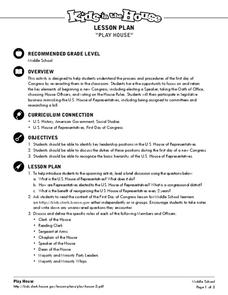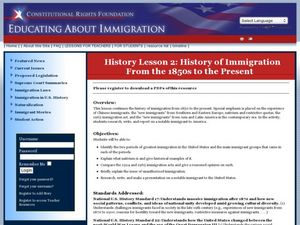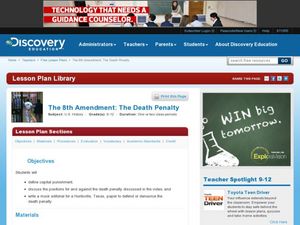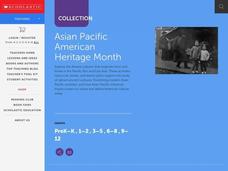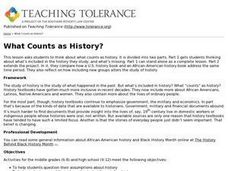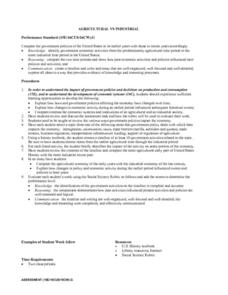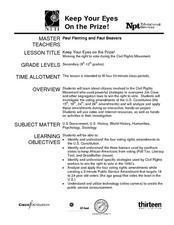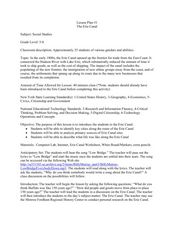Curated OER
Play House
Young scholars take a closer look at representative government. In this House of Representatives lesson, students discuss their local representative in Congress and research his or her responsibilities. Young scholars then participate in...
Curated OER
History of Immigration From the 1850's to the Present
Eleventh graders study the history of immigration from 1850 to the present. In this American History instructional activity, 11th graders compare the 1924 and 1965 immigration acts and give a reasoned opinion on each. Students...
Curated OER
The Bill of Rights
Students examine the intent Bill of Rights. In this American government lesson, students watch segments of the Discovery video "The Bill of Rights." Students discuss and debate the 4 Supreme Court cases featured in the video.
Curated OER
The Formation and Function of the Supreme Court
Students analyze the role of the U.S. Supreme Court. They read a handout and Article III, section 1 of the Constitution, analyze and rate by relevance noteworthy Supreme Court cases, and write how they decided each rating.
Curated OER
Telegram from Senator Joseph McCarthy to President Harry S. Truman
Students research Senator Joseph McCarthy's February 9, 1950 speech, given at Wheeling, West Virginia, in which he claimed more than 200 State Department employees were members of the Communist Party.
Curated OER
Giving Voice to History
Students examine the plight of Japanese Americans during World War II. In this World War II lesson, students participate in a mock evocation simulation, research primary and secondary documents about internment camps, and share their...
Curated OER
Portraits Of Power: American Presidents
Students discover the responsibilities of the presidency. In this U.S. government lesson, students watch "Portraits Of Power: American Presidents," and then compose essays regarding the citizens' relationship to the presidency.
Curated OER
The 8th Amendment: The Death Penalty
Students take a closer look at the death penalty. In this U.S. government lesson, students watch a Discovery video about capital punishment in the United States and then compose letters to the editors of newspapers about their stance on...
Curated OER
A Lesson To Accompany "The First Bank of the United States: A Chapter in the History of Central Banking"
Here is an interesting topic. Learners examine the economics that led to the founding of the First Bank of America. They participate in a reader's theater experience depicting the debate between Alexander Hamilton and Thomas Jefferson...
Curated OER
The Federalist Debates: Balancing Power Between State and Federal Governments
Young scholars examine the pros and cons of state sovereignty vs. federalism, as argued by the Founding Fathers. They identify the basic positions of each side, complete a worksheet, and write a persuasive essay arguing for Jefferson or...
Curated OER
Japanese American Baseball in the Camps
Students study Japanese American internment camps. In this American history lesson, students compare and contrast the camp internees' experiences with with team sports-related challenges students have encountered. Students discuss team...
Curated OER
What's Rome Got to Do With it?
Sixth graders examine the government of ancient Rome as well as their home country. They discover the basic structure of the government of Rome, their country, and another country.
Curated OER
Dorothea Lange and the Relocation of Japaneses Americans
Students analyze Dorothea Lange's photographs about Japanese American relocation. In this art and history lesson, students analyze a photograph about the relocation of Japanese Americans. Students discuss the impact of governmental...
Curated OER
End of the Line: What Happened to the Blue Ridge Railroad?
Sixth graders study the westward expansion and the role of railroad construction to the expansion. In this railroad history lesson, 6th graders complete KWL activity for the topic. Students view a PowerPoint about the growth of railroads...
Curated OER
Elections for Elementary Students
Students explore various websites that explain how primaries, caucuses, and general elections function. They view sample ballots, and analyze the executive branch, U.S. presidents, and citizenship.
Curated OER
What Counts as History?
Eighth graders explore the question "What Counts as History?" For this Philosophy lesson, 8th graders pretend that they are going to interview a historian. Students read a primary source and answer the questions that follow.
Curated OER
The US-Taiwan Textile Trade Case
Students explore the issues of free trade and protectionism by role-playing. In particular, they will learn how these terms apply to an understanding of U.S.-Taiwan trade in textiles. After a lecture/demo, students break into groups for...
Curated OER
Agricultural and Industrial Policies of the U.S.
Students examine the impact of laws and government policies on the agricultural and industrial economic systems. From a list of topics, they select one area and create timelines of at least ten related government activities. In...
Curated OER
Keep Your Eye On the Prize
High schoolers learn about citizens who were actively involved in the civil rights movement, and the strategies they used to overcome the Jim Crow laws that were so prevalent in the 1960s. They investigate the voting amendments of the US...
New York State Education Department
TASC Transition Curriculum: Workshop 11
You'll C-E-R a difference in classroom achievement after using a helpful lesson. Designed for economics, civics, government, and US history classes, participants practice using the CER model to craft arguments about primary and secondary...
Curated OER
Sow the Seeds of Victory!
Pupils use the National Archives and Records Administration's records to research the history of the U.S. Food Administation.
Curated OER
Chief Sealthe's Speech
Students explain the conflict over land between Native Americans and the United States government. They evaluate Native American values and the results of the U.S. expansion into Native American lands.
Curated OER
The Eerie Canal
Students discover bodies of water in the United States by investigating the Eerie Canal. In this U.S. Geography instructional activity, students discuss Lake Eerie and the canal that was built in order to transport goods. Students...
Benjamin Franklin Tercentenary
Classroom Constitutional Convention
Students investigate the eight phrases that comprise the Preamble to the U.S. Constitution to determine its principles and purpose. Their own Constitutional Convention is convened to craft a preamble for their school's governance.


